|
|
|
Sort Order |
|
|
|
Items / Page
|
|
|
|
|
|
|
| Srl | Item |
| 1 |
ID:
150043


|
|
|
|
|
| Summary/Abstract |
The energy sector depends on water in all phases of its life-cycle, including raw material extraction, power plant cooling, irrigation of biofuel crops and directly in hydropower generation. In the coming decades, several regions of the world are expected to experience a decrease in water resource availability, in part due to climate change. The dependence of the energy sector on water resources calls for an active effort to adapt to the possible scenarios. This paper presents a novel model that addresses the direct impacts of regional and temporal water shortages on energy operation and investment decisions. The paper investigates the costs and benefits of adapting the energy sector to climate-induced water scarcity. The results show that the increase in costs for an energy plan that considers future water stress is relatively small as compared to one which ignores it. A plan which ignores water constraints, however, may lead to significant economic damages when actually exposed to water shortages. The results also highlight the value of the availability of water for the energy sector, which is significantly higher than existing prices. The paper concludes that the potential benefits to be gained by integrating energy and water models can be considerable.
|
|
|
|
|
|
|
|
|
|
|
|
|
|
|
|
| 2 |
ID:
141776
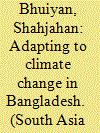

|
|
|
|
|
| Summary/Abstract |
Climate change poses a serious threat to humanity in developed and developing countries and is already affecting South Asia. This study examines the role that good governance plays for adapting to climate change in Bangladesh, arguing that lack of good governance in Bangladesh risks reducing adaptation preparedness to climate change in the country. There is evidence, mainly because of geophysical risk factors, to support arguments that good governance has anyway limited capacity in relation to adaptation measures to climate change in countries like Bangladesh. The article argues that the current politico-economic situation makes it doubtful whether Bangladesh will achieve the fullest possible ability to ensure good governance for better adaptation to climate change in the near future.
|
|
|
|
|
|
|
|
|
|
|
|
|
|
|
|
| 3 |
ID:
174334
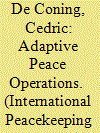

|
|
|
|
|
| Summary/Abstract |
Complexity theory offers a theoretical framework for analysing how social systems prevent, manage and recover from violent conflict. Insights from complexity suggest that for a peace process to become self-sustainable, resilient social institutions need to emerge from within, i.e. from the culture, history and socio-economic context of the relevant society. Peace operations are deployed to contain violence and to facilitate this process, but if they interfere too much, they will cause harm by inadvertently disrupting the very feedback loops critical for self-organization to emerge and to be sustained. To navigate this dilemma, the paper proposes employing an adaptive approach, where peace operations, together with the communities and people affected by the conflict, actively engage in an iterative process of inductive learning and adaptation. Adaptive Peace Operations is a normative and functional approach to peace operations that is aimed at navigating the complexity inherent in trying to nudge societal change processes towards sustaining peace, without causing harm.
|
|
|
|
|
|
|
|
|
|
|
|
|
|
|
|
| 4 |
ID:
161359
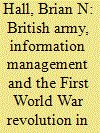

|
|
|
|
|
| Summary/Abstract |
Information Management (IM) – the systematic ordering, processing and channelling of information within organisations – forms a critical component of modern military command and control systems. As a subject of scholarly enquiry, however, the history of military IM has been relatively poorly served. Employing new and under-utilised archival sources, this article takes the British Expeditionary Force (BEF) of the First World War as its case study and assesses the extent to which its IM system contributed to the emergence of the modern battlefield in 1918. It argues that the demands of fighting a modern war resulted in a general, but not universal, improvement in the BEF’s IM techniques, which in turn laid the groundwork, albeit in embryonic form, for the IM systems of modern armies.
|
|
|
|
|
|
|
|
|
|
|
|
|
|
|
|
| 5 |
ID:
138234


|
|
|
|
|
| Summary/Abstract |
Coastal Bangladesh is experiencing the effects of weather and climate-related stressors. The paper reports on the ways in which members of nine occupational groups in two coastal villages in South-west Bangladesh understand and respond differentially to recent changes in local weather and weather-related events and processes. Their understanding is grounded in local experiences and varied livelihood options, which are a complex interaction between people’s social and spatial locations and local weather and non-weather events and processes. Their priorities are to protect livelihoods through resilience-building actions, which address proximate causes of vulnerability (improving coastal embankments, rehabilitating and strengthening homesteads, protecting agricultural land). Government support is limited to traditional development interventions that assist some more than others and often disconnected from local people’s priorities. Most adaptation actions are practical measures within the prevailing politico-legal order. There is some evidence of more rights-based cooperative action between a national non-governmental organisation and local farmers that challenged aspects of that order.
|
|
|
|
|
|
|
|
|
|
|
|
|
|
|
|
| 6 |
ID:
126848
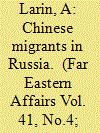

|
|
|
|
|
| Publication |
2013.
|
| Summary/Abstract |
Russian scholars have presented a comprehensive picture of the history of Chinese in Russia from the mid-19th century to our days. The study of the modern Chinese migration has been carried on in such important fields as the economic activity of Chinese migrants, the problems of "Chinese demographic expansion," adaptation and tolerance, and educational migration. An increase of the volume of low-skilled Chinese labor in Russia on a temporary basis is predicted.
|
|
|
|
|
|
|
|
|
|
|
|
|
|
|
|
| 7 |
ID:
172170


|
|
|
|
|
| Summary/Abstract |
This paper applies the concept of “communities of practice” to al-Muhajiroun (“the Emigrants”), an outlawed activist network that seeks to create an Islamic caliphate in Britain and the West through activism and proselytizing. Responding to recent studies on terrorism learning and adaptation, the author argues that focusing exclusively on the outputs of learning is unsatisfactory. Instead scholars should analyze learning as a process and unpack the causal mechanisms behind it. To support his within-case analysis, the author draws on extensive field work, including interviews and ethnographic observation. Newcomers to al-Muhajiroun learn the community’s norms and practices through repeated interactions with more experienced activists. These interactions take place in study circles and through companionship. Activists also learn by doing, preaching the Emigrants’ Salafi-Islamist ideology at da’wah stalls and protesting against the West’s “war on Islam” at demonstrations. The more they do, the better they become at performing the network’s high-risk activism, and the more deeply committed they become to its community of practice. However, far from allowing activists to adapt seamlessly to all challenges, the Emigrants’ insular and dogmatic community of practice creates its own problems, hindering its ability to innovate, expand, and thrive in an increasingly hostile environment.
|
|
|
|
|
|
|
|
|
|
|
|
|
|
|
|
| 8 |
ID:
170250
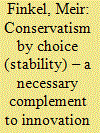

|
|
|
|
|
| Summary/Abstract |
Military innovation and adaptation are regarded as essential attributes of modern military organizations, while conservatism is condemned. Here I define and exemplify a new kind of conservatism – by choice, according to which military organizations deliberately choose not to change. The argument is twofold. First, a combination of conservatism by choice, innovation, and adaptation will lead to a more balanced and agile force than the current trend that over-emphasizes innovation. Second, conservatism by choice of professional military education, unit organization, and command philosophy will enable better utilization of innovations in the fields of weapon systems and tactical doctrine.
|
|
|
|
|
|
|
|
|
|
|
|
|
|
|
|
| 9 |
ID:
120331


|
|
|
|
|
| Publication |
2013.
|
| Summary/Abstract |
Understanding how terrorist groups innovate and adapt is key for anticipating future shifts in terrorist threats. Past innovation studies have identified factors that shape group behavior, as well as the importance of combining study of organizations' innovation doctrines with data on how these doctrines are put into practice. Here we describe such an analysis for two texts that have shaped al-Qa'ida and its associated movements' strategies: contrasting Naji's Management of Savagery with al-Suri's Call to Global Islamic Resistance-including elements of the latter relevant to innovation specifically translated for this work. Though open source data on the groups' innovation practices are necessarily more sparse, we contrast the doctrinal texts with selected examples, which suggest caution in assuming that group doctrine is necessarily put into practice "as written."
[Supplemental materials are available for this article. Please visit the publisher's online edition of Terrorism and Political Violence for the following free, supplemental resource: Translation of portions of Abu Mus'ab al-Suri's The Call for Global Islamic Resistance, relating to innovation and learning.]
|
|
|
|
|
|
|
|
|
|
|
|
|
|
|
|
| 10 |
ID:
115271
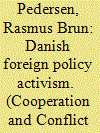

|
|
|
|
|
| Publication |
2012.
|
| Summary/Abstract |
Danish foreign policy is under transformation. Different versions of activism have gradually replaced adaptation and lately Denmark has participated more actively and independently in world politics than ever before. The core in activism is based on a liberal value system that seems to have replaced the adaptation logics dominating Danish foreign policy during the Cold War. Activism has evolved from a multilateral inspired activism in the 1990s to a more Atlantic centred activism during the 2000s. While analysts see the different phases as opposites, my argument is that the types of activism should be seen as a difference of degree rather than a difference of kind. 'Activism' as a foreign policy strategy, however, should be considered analytically as a difference in kind from the adaptation strategies that dominated Danish foreign policy during the Cold War. The main driving force behind this transformation can be found domestically in the Liberal Party's dominant position in Danish politics.
|
|
|
|
|
|
|
|
|
|
|
|
|
|
|
|
| 11 |
ID:
111121


|
|
|
|
|
| Publication |
2011.
|
| Summary/Abstract |
In late 2006, Andrew Marshall, the Director of the Office of Net Assessment in
the Office of the Secretary of Defense, asked us to answer several questions: Why
had the Royal Navy (RN) developed the angled flight deck, steam catapult, and
optical landing aid before the U.S. Navy (USN) did? Why had the USN not developed these innovations, which "transformed carrier
design and made practical the wholesale use of
high-performance jet aircraft," in parallel with the
RN?
1
Once developed by the RN, how had these three
innovations "jumped the gap" to the USN?
|
|
|
|
|
|
|
|
|
|
|
|
|
|
|
|
| 12 |
ID:
152522
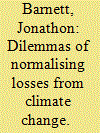

|
|
|
|
|
| Summary/Abstract |
The idea that climate change may cause the loss of atoll countries is now taken for granted in much of climate change science, policy and media coverage. This normalisation of loss means atoll countries now face a future that is apparently finite, which is a grievous situation no other country has to contend with. This paper explains the dilemmas this presents to atoll countries. If there is a risk of forced migration, then strategic planning can minimise its social impacts. Yet, doing so may bring future dangers into the present by undermining efforts to facilitate adaptation to climate change, creating new identities and deterring investments in sustainable resource management. To overcome this dilemma, the paper argues for a more hopeful approach to the future of atoll countries, because for as long as the science of loss remains uncertain, and the limits to adaptation are unknown, forced migration cannot be taken as a matter of fact and could possibly be averted through emission reductions and a vastly improved and significantly more creative approach to adaptation.
|
|
|
|
|
|
|
|
|
|
|
|
|
|
|
|
| 13 |
ID:
176827
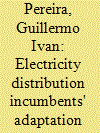

|
|
|
|
|
| Summary/Abstract |
The transition to a cleaner and smarter electricity system is being spurred by new policy approaches aiming at delivering a decentralized, digital, and decarbonized energy future. This calls for the adaptation of incumbent technologies, policies, and actors, as well as for the introduction of new system components. The changing role of electricity distribution systems, and of distribution system operators, has been a focal aspect of recent market design efforts, given the critical role of network infrastructure and the importance to adjust its operations, and regulatory framework. We build on a novel dataset from 124 DSOs and apply a methodology combining Factor analysis and a Tobit model to evaluate the role of market, regulatory, investment, and firm-level factors on technological, business model, and market design adaptation. Our results indicate that hybrid regulatory models contribute to DSOs adaptation. Investing in smart grids is found to have a positive effect on adaptation. Regarding firm-level characteristics, the results indicate that unbundling does not affect adaptation, however larger DSOs are found to be better able to adapt. These findings provide timely empirical evidence for advancing regulatory and policy approaches toward the adaptation of incumbents in a rapidly changing electricity sector.
|
|
|
|
|
|
|
|
|
|
|
|
|
|
|
|
| 14 |
ID:
169168
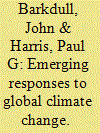

|
|
|
|
|
| Summary/Abstract |
Ecosystem-based adaptation (EbA) has recently emerged as an important way to address the impacts of climate change. EbA suggests that harnessing ecosystem services can help communities adapt to climate change, thereby limiting threats to social systems and human security. What are the arguments for and against EbA? Who favours EbA? What does EbA mean in practice? What are the limits to EbA as global average temperature rises? Reviewing documents of non-governmental organisations, governments, intergovernmental organisations and scholars helps answer these and related questions. As climate change results in increasing challenges for society, the more important all forms of adaptation, including EbA, will become. Yet, while useful and appropriate in certain contexts, EbA might not be sufficient if climate disruption becomes severe, which would require consideration of a transformational change in global institutions and practices.
|
|
|
|
|
|
|
|
|
|
|
|
|
|
|
|
| 15 |
ID:
158180
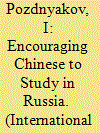

|
|
|
|
|
| Summary/Abstract |
For instance, foreign students who study in Australia and number between 480,000 and 520,000, about 30% of them Chinese, are the source of considerable state revenues for Australia, which grow by between 12% and 15% a year.1 New Zealand has become another leader in the world education market.2 Various studies have attempted to find out why Australia and New Zealand are such successful exporters of education. Those studies analyzed those countries' education advertising policies, adjustment principles for education programs and ways of simplifying visa formalities as measures that have stimulated young people all over the world, primarily in China and India, to seek paid education in Australia or New Zealand. The fact that both these countries are English-speaking and their education systems are associated with British classical education is their chief marketing advantage in Asia.
|
|
|
|
|
|
|
|
|
|
|
|
|
|
|
|
| 16 |
ID:
112937


|
|
|
|
|
| Publication |
2012.
|
| Summary/Abstract |
Understanding the energy consumption and emissions associated with health services is important for minimizing their environmental impact and guiding their adaptation to a low-carbon economy. In this post-hoc analysis, we characterize the energy burden of North American emergency medical services (EMS) agencies and estimate the potential marginal damage costs arising from their emissions as an example of how and why health services matter in environmental and energy policy, and how and why environmental and energy policy matter to health services. We demonstrate EMS systems are energy intensive, and that vehicle fuels represent 80% of their energy burden while electricity and natural gas represent 20%. We also demonstrate that emissions from EMS operations represent only a small fraction of estimated health sector emissions, but for EMS systems in the United States the associated marginal damage costs are likely between $2.7 million and $9.7 million annually. Significant changes in the supply or price of energy, including changes that arise from environmental and energy policy initiatives designed to constrain fossil fuel consumption, could potentially affect EMS agencies and other health services. We encourage cross disciplinary research to proactively facilitate the health system's adaptation to a low-carbon economy.
|
|
|
|
|
|
|
|
|
|
|
|
|
|
|
|
| 17 |
ID:
188906
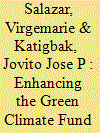

|
|
|
|
|
| Summary/Abstract |
The prevailing issues in the Green Climate Fund on implementation and governance can be seen as symptoms of the ills of the international climate finance architecture. These are compounded by the inadequate financial support provided by developed countries to developing countries and the low volume of funding channelled to adaptation projects. Evidently, the cited issues highlight the need to fully integrate the principles of justice and equity into the global climate change regime. Thus, this policy brief discusses the key challenges related to climate finance, and outlines several options and considerations on improving the Green Climate Fund operations using a climate justice lens. This paper intends to take a more normative and ethical discussion on the topic of climate finance.
|
|
|
|
|
|
|
|
|
|
|
|
|
|
|
|
| 18 |
ID:
188916
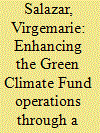

|
|
|
|
|
| Summary/Abstract |
The prevailing issues in the Green Climate Fund on implementation and governance can be seen as symptoms of the ills of the international climate finance architecture. These are compounded by the inadequate financial support provided by developed countries to developing countries and the low volume of funding channelled to adaptation projects. Evidently, the cited issues highlight the need to fully integrate the principles of justice and equity into the global climate change regime. Thus, this policy brief discusses the key challenges related to climate finance, and outlines several options and considerations on improving the Green Climate Fund operations using a climate justice lens. This paper intends to take a more normative and ethical discussion on the topic of climate finance.
|
|
|
|
|
|
|
|
|
|
|
|
|
|
|
|
| 19 |
ID:
165970
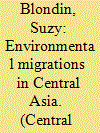

|
|
|
|
|
| Summary/Abstract |
Increasingly, studies are considering Central Asia a ‘hot spot’ of climate change and a region prone to environmental migrations. Growing aridity and the shrinking of glaciers may have important impacts on food security, health, human security and infrastructure in the region and compel people to move. Drawing on the literature on environmental issues in Central Asia and on interviews conducted in the Kuhistoni-Badakhshan Autonomous Region of Tajikistan, this article provides a literature survey on environmental migrations in the region and positions Central Asia in the current debates within the broad environmental migrations literature. The article shows that environmental issues can stand out as an important push factor for out-migration in Central Asia, highlights the important role of the Soviet heritage of environmental management as well as of post-Soviet socio-economic transformations in understanding these issues, and discusses possible adaptation strategies.
|
|
|
|
|
|
|
|
|
|
|
|
|
|
|
|
| 20 |
ID:
113323


|
|
|
|
|
| Publication |
2012.
|
| Summary/Abstract |
This article focuses on the psychological dimensions of deployment in peace operations. The first section examines whether South African military personnel find their deployments in these missions satisfying. The concomitant aim is to determine what motivated military personnel to serve in these missions where they were required to help, protect and save mostly civilians in countries to which they owe little allegiance. The focus then shifts to how peacekeepers cope with the stress associated with these missions, not only in terms of operations but also lengthy separations from family, friends and loved ones. The final section addresses issues of adaptation and reintegration upon their return. The findings of this part of the study indicate that peacekeepers serve in peace operations for a number of reasons. Most find the missions satisfying, but there are many stressors that affect their wellbeing and willingness to redeploy.
|
|
|
|
|
|
|
|
|
|
|
|
|
|
|
|
|
|
|
|
|